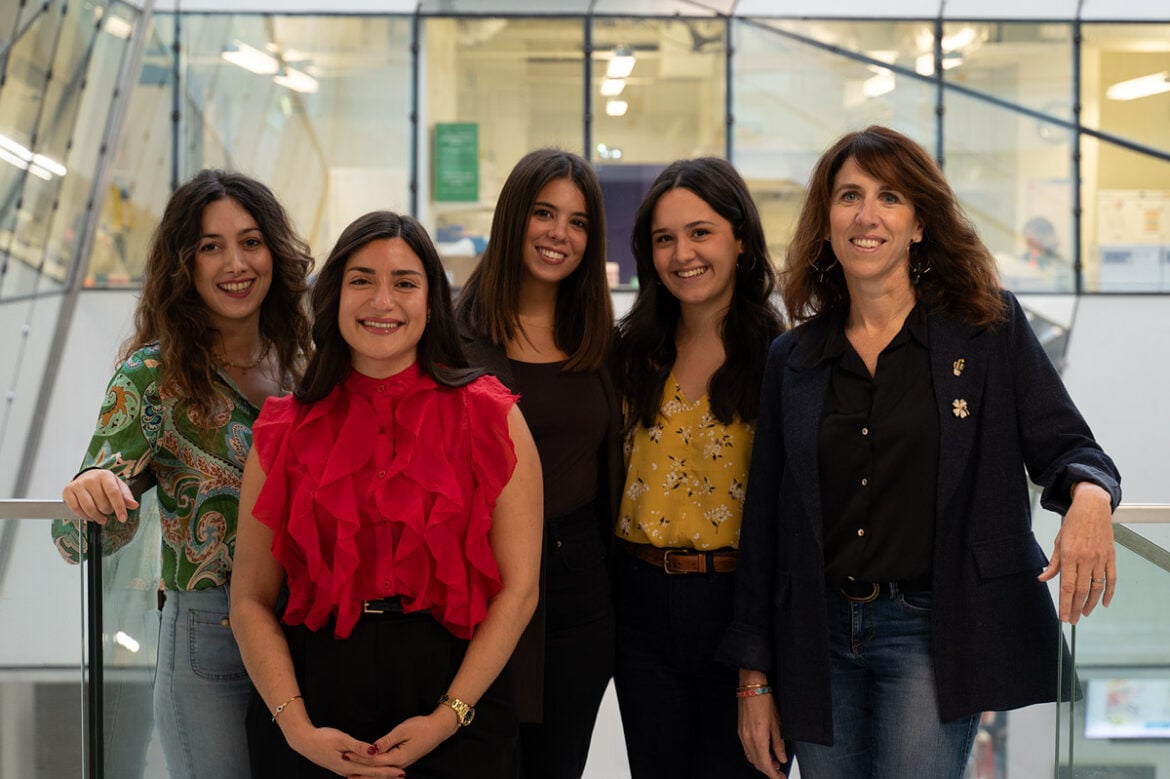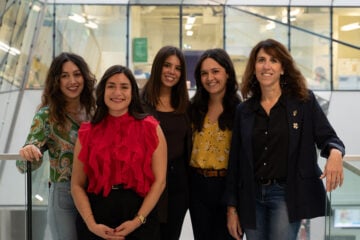
The NOMAD team, led by Agnès Nadjar, is joining the IMN
The IMN welcomes a new team, NOMAD (Neuroimmunology of Metabolic Health and Disease), led by Agnès Nadjar, since September 2025.
The team focuses on the communication between the immune system and the central nervous system, both under normal and pathological conditions.
Interview
Claire Delattre: Could you tell us about your background and the different roles you’ve held?
Agnès Nadjar: I was appointed as a lecturer at the University of Bordeaux in 2006 within the PsyNuGen unit. In 2009–2010, I had the opportunity to spend two years in Boston as a visiting scholar at Tufts University. Upon returning from the United States, I joined the NutriNeuro laboratory, where I stayed for ten years before joining the “Energy Balance and Obesity” team at the Neurocentre Magendie. In September 2025, I had the opportunity to create my own research team within the Institute of Neurodegenerative Diseases: “Neuroimmunology of Metabolic Health and Disease” (NOMAD).
In parallel, I was the coordinator of the Neurasmus Master’s program—an elite European Master’s in Neuroscience—from 2014 to 2022 (now managed by Pascal Fossat). Since 2022, I have been the director of the EUR Neurosciences graduate school and, since 2024, the co-director of the SVS doctoral school.
How do you feel about being a team leader?
I seized this opportunity despite some apprehension regarding the responsibilities it entails, both scientifically and administratively. It also meant relaunching our research activity in a new environment, with its own culture and practices. But I was attracted by the challenge and felt ready to take it on—especially in this laboratory, where I feel confident and well supported. I actually spent two years as a postdoctoral researcher at the IMN twenty years ago, and the collaborative spirit that prevails here still means a lot to me. Coming back as a team leader is truly a pleasure.
Could you tell us about your research project?
I have always been interested in neuroimmune interactions and how they are modulated by the environment. Today, my team studies how immune cells in the brain—microglia and meningeal immunity—regulate energy metabolism, with the goal of harnessing these mechanisms to prevent or slow down neurodegenerative diseases such as Alzheimer’s, which are accompanied by profound metabolic disturbances.
An important aspect of our work focuses on the sexual dimorphism of these responses.
For me, the IMN’s balance between fundamental research and clinical orientation is ideal: it allows us to anchor our projects in the context of neurodegenerative diseases while maintaining a translational perspective toward humans.
What are your team’s strengths, and what do you bring to the IMN?
We strengthen IMN’s research in neuroimmunology and glial cell biology—fields that are relevant to many of the institute’s physiopathological research areas. These concepts foster exchange and collaboration among the various teams on site. Together, we can learn from each other and help advance research at the IMN.
You’re the first woman to lead a team independently at the IMN. How do you feel about that? And your team happens to be entirely female.
I joined the IMN because of my scientific background, not my gender (at least I hope so!). That said, if my presence contributes to increasing the representation of women in science and at the IMN, that’s a very good thing. And if it shows young female researchers that it’s possible to take on leadership positions as a woman, that’s even better.
As for my team, the fact that it’s entirely female is pure coincidence. Each member was chosen for her skills and expertise, not her gender. That said, the numbers speak for themselves: most students in the Neuroscience Master’s program—at least in Bordeaux—are women. It’s mainly in leadership positions that their presence remains rare.
Could you introduce your team?
As of today, the NOMAD team is composed of two PhD students, Giulia Cutugno and Evita Kyriakidou, and a research engineer, Jeanne Vergne.
Giulia and Evita are both recipients of Marie Curie fellowships (MSCA Doctoral Network program), while Jeanne was hired for two years on an Eranet NEURON project.
Starting next February, we will welcome Jade Thomas, a Master’s student from Bordeaux’s NeuroBIM program, and Lou Taussac, a professional Bachelor’s student from Toulouse. They will both be with us for six months.
More women again!
Contact
Agnès Nadjar :
Centre Broca Nouvelle-Aquitaine
3rd floor – Office 364
Selected publications
- Isolation of Hypothalamic Microglia from Freshly Perfused Adult Mouse Brain by Magnetic-Activated Cell Sorting
Evangelia Kyriakidou, Giulia Cutugno, Camille Allard, Agnes Nadjar.
JoVE. 2024-09-06. (211)
DOI: 10.3791/66769 - Rethinking the role of microglia in obesity
G. Cutugno, E. Kyriakidou, A. Nadjar.
Neuropharmacology. 2024-04-01. : 109951.
DOI: 10.1016/j.neuropharm.2024.109951 - Microglial homeostasis disruption modulates non-rapid eye movement sleep duration and neuronal activity in adult female mice
Katherine Picard, Giorgio Corsi, Fanny Decoeur, Maria Amalia Di Castro, Maude Bordeleau, Marine Persillet, Sophie Layé, Cristina Limatola, Marie-Ève Tremblay, Agnès Nadjar.
Brain, Behavior, and Immunity. 2023-01-01. 107 : 153-164.
DOI: 10.1016/j.bbi.2022.09.016 - Microglia states and nomenclature: A field at its crossroads
Rosa C. Paolicelli, Amanda Sierra, Beth Stevens, Marie-Eve Tremblay, (…) Agnes Nadjar, (…), Susanne A. Wolf, Long-Jun Wu, Tony Wyss-Coray.
Neuron. 2022-11-01. 110 (21) : 3458-3483.
DOI: 10.1016/j.neuron.2022.10.020 - N-3 PUFA Deficiency Affects the Ultrastructural Organization and Density of White Matter Microglia in the Developing Brain of Male Mice.
Fanny Decoeur, Katherine Picard, Marie-Kim St-Pierre, Andrew D. Greenhalgh, Jean-Christophe Delpech, Alexandra Sere, Sophie Layé, Marie-Eve Tremblay, Agnès Nadjar.
Front. Cell. Neurosci.. 2022-02-10. 16
DOI: 10.3389/fncel.2022.802411 - Microglial Cannabinoid Type 1 Receptor Regulates Brain Inflammation in a Sex-Specific Manner
Julia De Meij, Zain Alfanek, Lydie Morel, Fanny Decoeur, Quentin Leyrolle, Katherine Picard, Micael Carrier, Agnes Aubert, Alexandra Séré, Céline Lucas, Gerald Laforest, Jean-Christophe Helbling, Marie-Eve Tremblay, Daniela Cota, Marie-Pierre Moisan, Giovanni Marsicano, Sophie Layé, Agnès Nadjar.
Cannabis and Cannabinoid Research. 2021-12-01. 6 (6) : 488-507.
DOI: 10.1089/can.2020.0170 - N‐3 PUFA deficiency disrupts oligodendrocyte maturation and myelin integrity during brain development
Quentin Leyrolle, Fanny Decoeur, Cyril Dejean, Galadriel Brière, Stephane Leon, Ioannis Bakoyiannis, Emilie Baroux, Tony‐Lee Sterley, Clémentine Bosch‐Bouju, Lydie Morel, Camille Amadieu, Cynthia Lecours, Marie‐Kim St‐Pierre, Maude Bordeleau, Véronique De Smedt‐Peyrusse, Alexandran Séré, Leslie Schwendimann, Stephane Grégoire, Lionel Bretillon, Niyazi Acar, Corinne Joffre, Guillaume Ferreira, Raluca Uricaru, Patricia Thebault, Pierre Gressens, Marie‐Eve Tremblay, Sophie Layé, Agnes Nadjar.
Glia. 2021-09-14.
DOI: 10.1002/glia.24088 - Microglia–Neuron Crosstalk in Obesity: Melodious Interaction or Kiss of Death?
Stéphane Léon, Agnès Nadjar, Carmelo Quarta.
IJMS. 2021-05-15. 22 (10) : 5243.
DOI: 10.3390/ijms22105243 - Essential omega-3 fatty acids tune microglial phagocytosis of synaptic elements in the mouse developing brain.
C. Madore, Q. Leyrolle, L. Morel, M. Rossitto, A. D. Greenhalgh, J. C. Delpech, M. Martinat, C. Bosch-Bouju, J. Bourel, B. Rani, C. Lacabanne, A. Thomazeau, K. E. Hopperton, S. Beccari, A. Sere, A. Aubert, V. De Smedt-Peyrusse, C. Lecours, K. Bisht, L. Fourgeaud, S. Gregoire, L. Bretillon, N. Acar, N. J. Grant, J. Badaut, P. Gressens, A. Sierra, O. Butovsky, M. E. Tremblay, R. P. Bazinet, C. Joffre, A. Nadjar, S. Layé.
Nat Commun. 2020-11-30. 11 (1)
DOI: 10.1038/s41467-020-19861-z - Maternal dietary omega-3 deficiency worsens the deleterious effects of prenatal inflammation on the gut-brain axis in the offspring across lifetime
Q. Leyrolle, F. Decoeur, G. Briere, C. Amadieu, A. R. A. A. Quadros, I. Voytyuk, C. Lacabanne, A. Benmamar-Badel, J. Bourel, A. Aubert, A. Sere, F. Chain, L. Schwendimann, B. Matrot, T. Bourgeois, S. Grégoire, J. G. Leblanc, A. De Moreno De Leblanc, P. Langella, G. R. Fernandes, L. Bretillon, C. Joffre, R. Uricaru, P. Thebault, P. Gressens, J. M. Chatel, S. Layé, A. Nadjar.
Neuropsychopharmacol.. 2020-08-11.
DOI: 10.1038/s41386-020-00793-7
Last update 27/11/25
